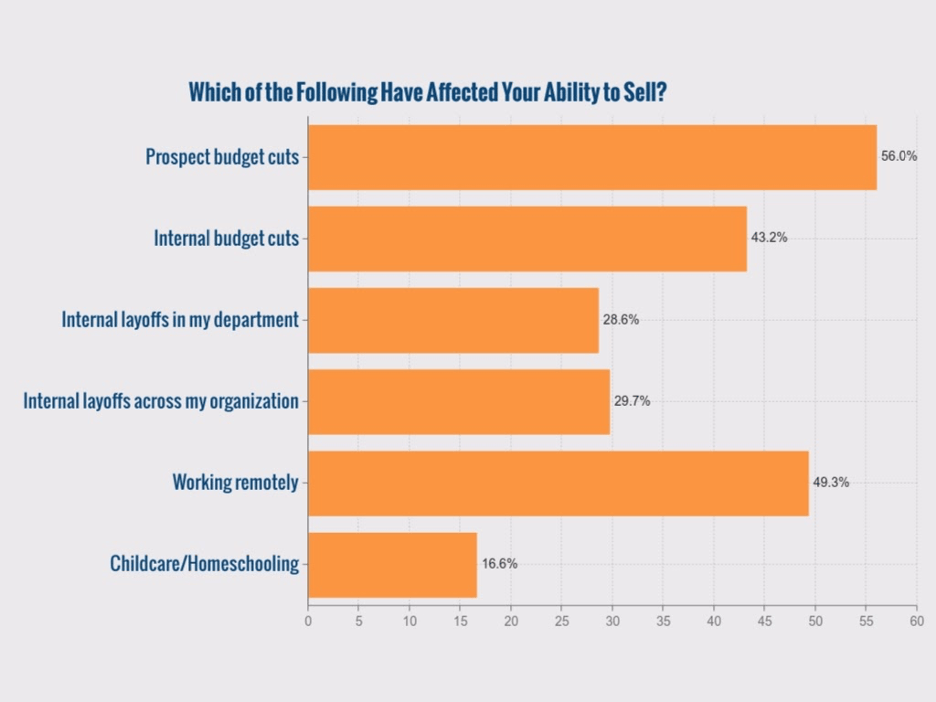Estimated to be a $220 billion industry in 2022, software as a service (SaaS) continues to be one of the hottest sectors of the U.S. economy. The industry’s prominence, propelled by tech giants such as Google, Salesforce, and Zoom, makes it a bellwether of sorts for predicting future shifts in the economy. A recent survey of 755 sales professionals in the SaaS space — commissioned by me as the founder of sales outsourcing company SalesRoads — suggests the future of work isn’t defined by a single location, but rather by giving employees the choice to work from anywhere. Several key statistics from the survey illustrate the state of the industry and expectations for the future; view the full report here.
What percentage of your sales team has started working remotely for the first time?

(Graphs: SalesRoads)
Unsurprisingly, many organizations began piloting remote work in response to the COVID-19 outbreak. In total, 60.2 percent of respondents indicated that more than half of their sales team was working remotely for the first time, with another 31.1 percent reporting this for roughly a quarter to half of their sales team.
Although it may be tempting to focus on the fact that nearly 40 percent of teams are still working predominantly in the office, there is a more compelling narrative about exposure to remote work; more than 90 percent of respondents reported working on a team with a significant portion of their peers (over 25 percent) working remotely.
The takeaway? People are being exposed to remote work in droves, and they are likely to be more comfortable with remote collaboration as a result.
What percentage of your sales team do you expect to stay remote permanently?

Despite the exposure to remote work, most organizations are slightly less bullish on the prospect of working permanently from home, with only 41.6 percent of respondents expecting that more than half of their team will forgo returning to the office.
Interestingly, however, over three-quarters of those surveyed suggested that at least 25 percent of their sales team would continue working remotely. This implies that most organizations aren’t taking an all-or-nothing approach to working from home, but rather opting for a mix of office and homebound employees.
Are you more or less likely to consider remote work in the future?

When it comes to predicting the future of work, this is where rubber meets the road. Ninety-three percent of respondents said they are more likely to consider remote work in the future. Conversely, only seven percent of respondents are less interested in remote work after the coronavirus outbreak.
With the better portion of surveyed teams working at least partially remote, and with the vast majority of respondents expressing positive inclinations regarding work from home, it begs the question, “How long until remote work is the standard, not the exception?”
Notwithstanding the data mentioned above, there is one question that gives caution to the idea of a mostly remote workforce in the near future.
Which of the following have affected your ability to sell?

Contrary to the positive outlook on remote work expressed by the plethora of respondents, a whopping 49.3 percent of respondents noted that working from home was affecting their ability to sell. In fact, working from home was the second-most cited disruption, beating internal budget cuts (43.2 percent), organizational layoffs (29.7 percent), and homeschooling/childcare (16.6 percent).
At the end of the day, organizations will need to forge their own path back to the office, if at all. Individual circumstances such as employee preference and productivity while working from home will be the determining factors for most businesses. Brian Handly, CEO of Reveal Mobile, summarized nicely when asked about his organization’s stance on remote work: “As long as you’re getting the job done, we’re good with that.”
David Kreiger C99 WG07 is founder and president of SalesRoads, a sales outsourcing company with a fully remote workforce.


























